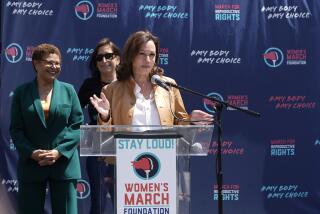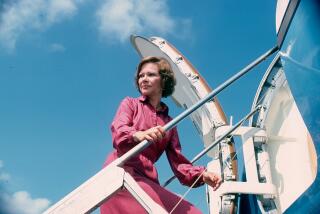New Home, State of Affairs for First Lady
- Share via
WASHINGTON — On the same day that Hillary Rodham Clinton unpacked boxes at her new home in New York--another milestone in her unprecedented move to run for the Senate while still serving as first lady--Ron and Mavis Barth were marveling at the Christmas decorations she had put up in her other house--the one here in the 1600 block of Pennsylvania Avenue.
The Barths, from Eugene, Ore., interviewed Wednesday after their White House tour, were united in their antipathy toward the Clintons. But they were split--like much of America--on the first lady’s move to Chappaqua, N.Y., with more than a year left in President Clinton’s last term.
“If she needs to be at that address . . . to run, it’s appropriate for her to do that,” said Ron, a 63-year-old pastor. “She wants to establish her own political career. I would say he’s had his chance. Now it’s her chance.”
His wife, a 62-year-old homemaker, disagreed: “I’d like to see her finish her term as first lady. ‘Commitment’ is a big word in my vocabulary. Finish it out.”
Just how far Mrs. Clinton is committed to serving as first lady during her husband’s waning presidency remains a mystery. Until now, she has been deeply involved in both the ceremonial duties of the job, like planning three state and two official dinners last year, and in the nitty-gritty of steering presidential policy in a multitude of areas.
Her own public comments on the subject have been limited. Late last year, Mrs. Clinton said she planned to scale back her White House obligations to make time to run for the seat being vacated by Sen. Daniel Patrick Moynihan (D-N.Y.).
While her candidacy is still unofficial, Democratic officials have cleared the primary field for Mrs. Clinton. New York Mayor Rudolph W. Giuliani is her expected Republican opponent.
Mrs. Clinton’s loyalists insist that she will continue to have a hand in issues of longtime interest to her, such as education and health care. Her priorities, they say, will be reflected in the president’s upcoming budget and State of the Union address. There are no plans afoot to cut back her staff of about 20.
Current and former aides note that the Clintons have much experience at combining campaigns with government duties as first couple both here and in Arkansas. They say Mrs. Clinton is able to manage many affairs from the road by fax or e-mail.
“She may make a phone call instead of being present at a meeting,” said Melanne Verveer, the first lady’s chief of staff. “She may make a video instead of being at a public event.”
But a virtual first ladyship is not the same thing as being there. And while there is precedent for first-lady absenteeism--Eleanor Roosevelt kept an apartment in New York City, for instance, and Bess Truman often stayed home in Missouri--Americans are sure to debate Mrs. Clinton’s attempt to distance herself from a job she has reshaped aggressively in her own image.
“She’s spent seven years trying to argue that the first lady isn’t just this anachronistic throwback to the Victorian era but is in fact an important, substantive job,” said Gil Troy of McGill University in Montreal, an expert on presidential couples. “Being first lady is not just about the responsibilities; it’s about the expectations of the American people, which won’t go away.”
Those expectations have evolved throughout the nation’s history. Thomas Jefferson, the third president, was a widower. But Dolley Madison, the wife of James Madison--Jefferson’s secretary of State and a future president himself--was his hostess and became so famous that she helped inspire the moniker “first lady.” James Buchanan, the 15th president and the chief executive who never married, enlisted his niece Harriet Lane to serve as hostess.
Some first ladies have been reclusive and others have reveled in the limelight. In the second half of the 20th century, though, the rise of wall-to-wall media coverage of the White House made it much more difficult for first ladies to choose seclusion.
Mary Regula, founder of the National First Ladies’ Library in Canton, Ohio, and wife of a Republican congressman, predicted that the public will cut Hillary Clinton some slack.
“Why do we expect that this is a role she must play?” Regula asked. “When we have a ‘first gentleman’ at the White House, will we expect him to drop everything and be the official host and take care of all these duties? Or will we say that his responsibility to his profession is even more important? This is an exciting time. It shows that a first lady can move on with her life.”
A Gallup poll in November found that Americans were evenly split on whether it was appropriate for Mrs. Clinton to run for Senate while first lady. But a solid majority said that, if she does run, it would be appropriate for her to end her first lady duties and move to New York.
The president seems to have faith the public will understand his wife’s divided loyalties. He is doing his part. He traveled with her to Chappaqua and planned to spend Wednesday night there.
More to Read
Sign up for Essential California
The most important California stories and recommendations in your inbox every morning.
You may occasionally receive promotional content from the Los Angeles Times.













